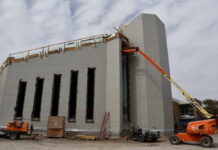What is diversity? Am I even diverse? Upon hearing the word diversity, students are plagued with these two questions. I myself, had never thought of myself as diverse, until I took a closer look at the Diversity and Outreach Services here at Jesuit.
Diversity, led by director Mr. Erik Burrell, strives to find the magis, “the more,” inside each individual and other members of their community, for each person is unique in his own way. Whether they stem from their race/ethnicity, religion, socio-economic background, etc., each member of Diversity recognizes their differences, and in doing so, attempts to fabricate a unified entity to build a stronger community and to commit themselves to social justice.
To achieve a stronger community and a stronger self, Diversity focuses on three pillars: Outreach, Retention, and Awareness. Outreach, according to Mr. Burrell, “is reaching out into the community and encouraging students to attend” Jesuit. He says Retention “is helping developing programs to help students succeed here at Jesuit.” Finally, he explains that Awareness “is looking at the entire community, looking at different ways we can promote diversity.” Diversity manifests these pillars in their actions through Jesuit clubs and organizations within the greater community.
Jesuit’s own Multicultural Society meets once every two weeks for discussions. These interactions guide students to understand how different components of diversity interconnect and how important these aspects can be in American life. The 300 (and growing) members discuss topics such as the current National Hispanic American Heritage Month and dialogue between religions. This dialogue can lead to a greater respect for others, no matter their background.
Another pillar of diversity is the mentoring program, in which Jesuit students and middle school students attend football games and other events together. The Jesuit mentor teaches the middle school mentee the ins and outs of Jesuit, checks in with him every month by phone, and forms a lasting bond with the kid.
Miguel Sotelo ’14, a participant in Diversity and its Mentoring program, explained that “the Mentoring program definitely reaches out to the young ones” and allows for the mentor and the mentee to enjoy each other’s presence. Miguel also suggests that learning can be mutual as it is his “personal goal” to learn more about his assigned mentee this year.
Finally, to truly extend their reach to the greater community, Diversity sponsors DADYO (Dallas Area Diversity Youth Organization), a diversity youth organization that partners with other private schools in the Dallas area. Joining Ursuline, St. Mark’s, Hockaday, and Greenhill, DADYO meets to discuss what commonalities and differences regarding diversity that each of the schools shares in their campus lives. This allows for a better understanding of diversity and ways to embrace it within each of the schools. Diversity has goals for the future to include more collaboration among clubs within the Jesuit community, such as Student Council and Key Club.
The Diversity Program at Jesuit also strongly embraces the Jesuit motto of “Men for Others.” Being “Open to Growth” in terms of diversity, according to Sotelo, means “being open to giving other people opportunities to explore other cultures, and it allows us to simply value the company of each individual because of this outreach service.” He personally defines diversity as “gathering with my fellow brothers from distinct ethnicities and sharing with each other the solidarity and love Jesus gives us.” This definition of diversity combines both the religious and loving aspects of the Jesuit profile.
As Mr. Burrell reflects on how the student body displays diversity, he specifically recalls that during Senior Community Days, he witnessed “cohesiveness” among the students and an “understanding of who different people are and a willingness to accept that.” Diversity, in Mr. Burrell’s eyes, reaches out to all individuals. In addition, when asked about the legacy he envisions the class of 2014 leaving at Jesuit in terms of diversity, Mr. Burrell emphasizes that he wants the class to serve as good role models for the underclassmen who will lead the school in the years to come.
Now, when I ask myself the question about whether or not I am diverse, I know that the answer is a resounding yes, and I know that the Diversity program at Jesuit has a place for me and all who want to make a difference in the world.






